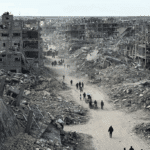Bangui, 27/08/2015 – ASF (Avocats Sans Frontières) has recently launched support activities to help facilitate better access to justice in the Central African Republic. In the wake of successive politico-military crises, the country’s judicial institutions need to be rebuilt. In collaboration with legal stakeholders, the Bar association and civil society, ASF’s actions aim to contribute to improving access to justice for vulnerable people.
In 2012-2013, the Central African Republic (CAR) experienced an unprecedented humanitarian crisis, leading to the deaths of thousands of people and displacing whole populations. Today, relative calm has descended on this country and its 4.6 million inhabitants, which has been rocked by politico-military crises since its independence in 1960.
The need for justice is great. The 120 lawyers who make up the Bar are all gathered in the capital Bangui, working in difficult conditions. Civil society organisations (CSO) remain very weak.
“The justice system in the Central African Republic is weak, slow and costly. It is a two-speed justice: one speed for the wealthy and one for the poor”, stated Arsène Sende, Inspector General for Justice.
The justice sector has a severe lack of funds, with a budget representing only 0.15% of the overall public budget. This has resulted in numerous consequences, including widespread impunity and corruption. Justice no longer fulfils its role to protect citizens and guarantee their rights, and is widely mistrusted by the population.
This analysis was shared during the first workshop for the official launch of ASF’s activities in the CAR in July in Bangui. Representatives from judicial institutions (the Ministries for Justice and Planning, the Inspectorate General for Justice, the Judicial Council, the Bar) and international donors were present.
The Minister for Justice’s Cabinet celebrated the arrival of ASF at a time when “the Constitutional Charter for transition prioritises access to justice for all”. According to its Director, the Central African judicial system will be able to “benefit from ASF’s expertise regarding (access to) justice in the countries of the Great Lakes sub-region”.
The stakes are high as the task is to (re)build the rule of law. “The justice system can expedite or hinder a country’s development through its organisation and operation, and it is now up to the people of the Central African Republic to choose what they want”, believes Mr Sende, Inspector General for Justice.
“Our project is developing against a backdrop of real needs and expectations regarding access to justice, in particular for vulnerable people”, explains Boubacar Diabira, head of the ASF mission in Bangui.
The ASF team will implement the following activities: disseminating the law to the population and stakeholders in the justice system, supporting civil society organisations to help them relaunch legal aid services and support for coordinating legal aid, supporting mobile courts with birth registration and capacity-building for lawyers and civil society organisations.
Mainly financed by the European Union (budget: EUR 352,000), the project will last for 24 months.
Cover picture: ©ASF



